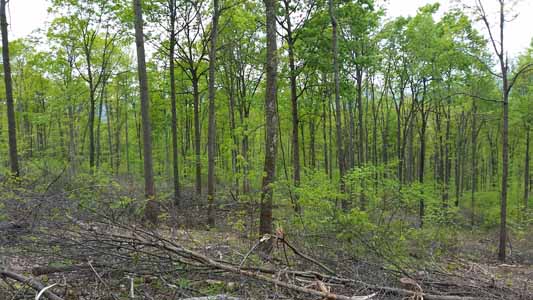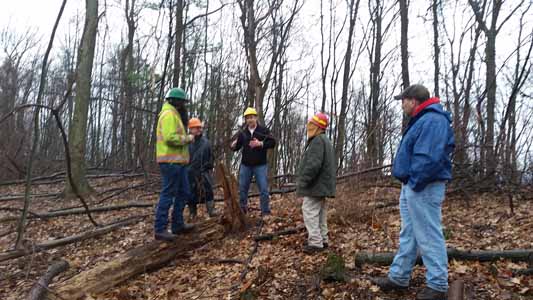The Appalachian Mountains Joint Venture (AMJV) is working with partners to provide a variety of opportunities for private landowners in improving habitat on their property to benefit a variety of birds and other wildlife, including game species and even pollinators. Management guidance is available to help landowners interested in enhancing wildlife habitat on their land. Financial assistance is available through federal, state, and local programs to offset the costs of planning and implementing practices on the ground, including:
Farm Bill Programs
Since the 1980s, the voluntary conservation efforts of farmers, ranchers, forest landowners, and other private landowners have been supported by a series of federal laws collectively known as the Farm Bill. The Farm Bill is the largest source of federal funding for private lands conservation. The U.S. Department of Agriculture administers Farm Bill programs, primarily through the Farm Service Agency and the Natural Resources Conservation Service (NRCS).
For more information about Farm Bill Conservation Programs: Farm Bill Field Guide to Fish and Wildlife Conservation
Conservation programs in the 2018 Farm Bill include:
Through EQIP, NRCS provides private landowners with financial resources and one-on-one help to plan and implement conservation practices to improve water and air quality, and provide better wildlife habitat. Through EQIP, you can voluntarily implement conservation practices, and NRCS co-invests in these practices with you. NRCS financial assistance covers part of the costs from implementing conservation practices. These practices are geared towards working farms and forests, and provide producers with many options for conservation.
The Conservation Stewardship Program (CSP) helps you build on your existing conservation efforts while strengthening your working farm or forest. Whether you are looking to improve grazing conditions, increase crop yields, or develop wildlife habitat, we can custom design a CSP plan to help you meet those goals. If you are already taking steps to improve the condition of the land, chances are CSP can help you find new ways to meet your goals.
If you are interested in this learning more about these or other federal conservation programs, visit Getting Assistance or contact your local USDA Service Center.
U.S. Fish and Wildlife Service Partners for Fish and Wildlife
The Partners for Fish and Wildlife Program provides technical and financial assistance to private landowners interested in improving habitat for migratory birds, endangered, threatened and at-risk species while maintaining the their primary land management goals. This is a voluntary program in which landowners continue to manage their land for their objectives as well as for wildlife, which most of the time go-hand-in-hand.
U.S. Forest Service State and Private Forestry Cooperative Forestry Program
The U.S. Forest Service helps ensure that forest landowners have the best technical, educational, and financial assistance available to achieve their unique objectives and to keep forests working for all of us. We do this through a variety of Cooperative Forestry programs, including Forest Legacy, Forest Stewardship, and Wood Innovation.
Developed by the American Forest Foundation and The Nature Conservancy, the Family Forest Carbon Program brings together family forest owners and companies to improve forest health, address climate change and support American communities.
Planning Assistance
Hosted by the American Forest Foundation, My Land Plan can help you explore and discover how to manage your woodlands. Easy to use tools guide you to map your land, set goals, keep a journal and connect with woodland owners and foresters.
Taxation Assistance
U.S. Forest Service: Forest Taxation
This website offers timber tax information for private forest landowners, including workshops, webinars, and other guidance.
The National Timber Tax Website was developed to be used by timberland owners, as well as a reference for accountants, attorneys, consulting foresters and other professionals who work with timberland owners regarding the tax treatment of timber related activities.
Estate Planning
National Timber Tax Website: Estate Planning
Estate planning is a very personal process involving legal counsel and family members. Many timberland owners are concerned about what will happen to their timberland after they die. This site provides basic information that you can use to inform your discussions with your attorney and family as you develop your estate plan. Minimizing transfer taxes tends to dominate discussions of estate planning, but this is only one aspect. Other considerations include support and care of a surviving spouse, the needs of children, and helping favorite charities, among many others.
Conservation Easements
Considering a conservation easement on your land? The Land Trust Alliance offers information on the basics of easements, a list of questions to consider, and will also help you find a land trust near you.
This site offers a great background on conservation easements, including tax consequences, easement terms, benefits of an easement, and your rights as a landowner.

Five reasons why having a forest management plan is one of the most important things you can do for your woodlot.
Read More
How working with a professional forester can help you manage your land to meet your goals.
Read More© 2018 appalachian mountains joint venture 1900 Kraft Drive Suite 250 Blacksburg, VA 24061 Office: (540) 231-9519
Website by Skyhound Internet Funded by: AMJV Partners
Appalachian Mountains Joint Venture
1700 Kraft Drive, Suite 1375
Blacksburg, VA 24060
Office: (540) 951-9376
© 2019 Appalachian Mountains Joint Venture Funded by: AMJV Partners Website by Skyhound Internet
